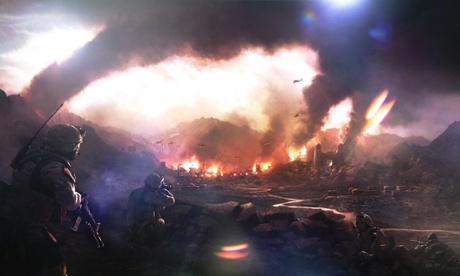
Tonje Hessen Schei’s latest documentary, Drone, provides a disturbing glimpse into the CIA’s use of remotely piloted aircraft. One of its allegations is that young gamers are being directly recruited to take control of craft as they carry out missions throughout the world. In the modern era, the skills that players develop in military simulations are now a valuable military resource.
How should we feel about that? And how should we feel about first-person shooters in general? Games such as Call of Duty and Battlefield sell in their millions, dominate the charts and present a very particular view of war and how it is fought. Fans call it escapist entertainment, but with warfare becoming ever more automated and game-like, how long can developers absolve themselves of sociopolitical responsibility? Is it still OK to play at being soldiers in games that barely register the complex realities of the conflicts they represent?
To explore this issue, Guardian Live – in association with UCL – is holding a special event on 9 April, inviting game developers and academics to discuss the issues of violence, the military and morality in gaming. The idea is not just to look at military simulations, but to analyse the appeal and meaning of first-person shooters. They’re often beautifully designed and thrilling, but what responsibilities do developers have? And what do even outlandish, sci-fi shooters like Halo tell us about the core appeal of the genre?
Taking part in the discussion, are:
- Dr Felix Ciuta, University College London: lecturer and expert in geopolitics, the military and mass culture
- Kyle Grayson, Newcastle university: lecturer and researcher who has written about drones, the “playstation mentality”, and the military in popular culture
- Marcus Schulzke, Leeds University: currently researching the militarisation of video games and social media
- Simon Parkin: a journalist who has investigated the relationship between arms manufacturers and military video game developers
- Ed Stern, Splash Damage: a game narrative designer who has worked on several first-person shooters including Brink and the forthcoming Dirty Bomb
- Tim Browne, ex-Codemasters: a designer on the acclaimed Operation Flashpoint series of military strategy shooters
Our aim is to really get to grips with the links between the military and shooter culture, and to discuss how games should approach violence in the context of modern high-tech warfare.
The discussion takes place on 9 April, from 7pm, at the Guardian, Kings Place, London. Tickets are £10 and are available from Guardian Membership.

